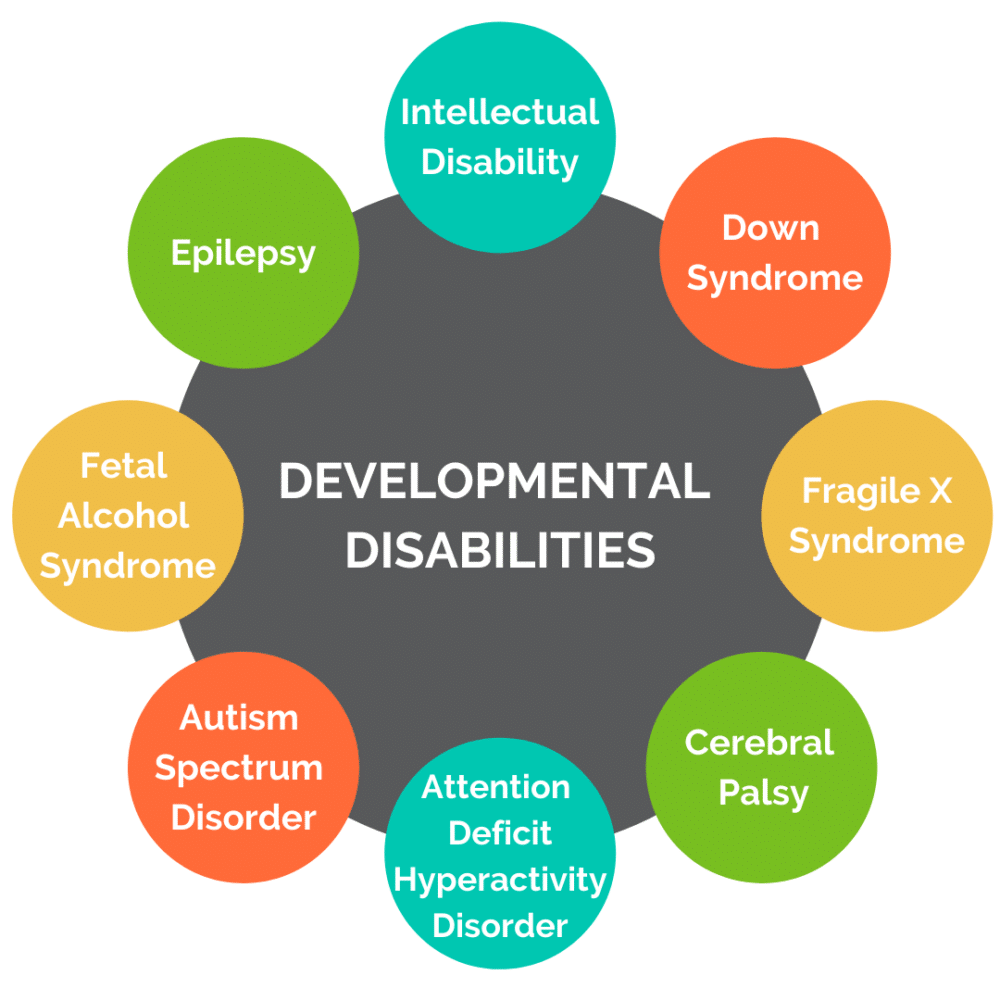Developmental disabilities are a diverse group of conditions that emerge from anomalies in human development. These disabilities are typically identified during childhood and last throughout a person’s life. They encompass a range of intellectual, physical, and sensory impairments that may affect how a person learns, communicates, moves, and interacts with others. This blog post will explore the causes, treatment options, and support available for individuals with developmental disabilities. Our intellectual or developmental disability support at Brimex Medical, Inc. ensures comprehensive services to help patients find their rightful place in the community, enhancing their quality of life and promoting inclusion.
Understanding Developmental Disabilities
The term “developmental disability” refers to a condition that arises due to developmental anomalies. The key feature is its onset before adulthood and the need for ongoing support. Examples include intellectual disability, autism spectrum disorders, cerebral palsy, epilepsy, and sensory impairments such as hearing and visual disabilities.
History of the Concept
The concept of developmental disabilities was formalized in the United States in the 1960s. Initially, it was associated with conditions like mental retardation (a term no longer in use and replaced by intellectual disability), cerebral palsy, and epilepsy. By the 1970s, the definition expanded, incorporating functional limitations rather than just specific diagnoses. This shift acknowledged that developmental disabilities encompass a broader range of conditions that can limit a person’s capacity in major life activities, such as communication, learning, and mobility.
In the United States, the Developmental Disabilities Act established a framework for defining and addressing these conditions. Although it originated as a national concept, other countries have adopted similar approaches, sometimes varying significantly in terms of policy and social integration.
Causes of Developmental Disabilities
The causes of developmental disabilities are diverse and multifactorial. Often, there is no single identifiable cause. Instead, various genetic, environmental, and perinatal factors contribute to the onset of these conditions.
Genetic Factors
Genetic conditions like Down syndrome and Fragile X syndrome are some of the most well-known causes of developmental disabilities. These conditions result from anomalies in the chromosomes that affect physical and cognitive development. Advances in genetic testing have made it easier to identify these conditions early, allowing families to seek timely support.
Environmental Factors
Environmental influences such as exposure to toxins, infections, or malnutrition during pregnancy can lead to developmental disabilities. For example, maternal alcohol consumption during pregnancy can cause fetal alcohol spectrum disorders (FASDs), leading to intellectual and physical impairments in the child. Similarly, exposure to certain chemicals or lack of essential nutrients can have long-term effects on a developing fetus.
Perinatal and Neonatal Complications
Complications during childbirth, such as oxygen deprivation, premature birth, or infections, can increase the risk of developmental disabilities. Birth asphyxia, for instance, can lead to cerebral palsy, while neonatal infections can damage brain tissues, affecting a child’s cognitive and physical capabilities.
Prevalence of Developmental Disabilities
The prevalence of developmental disabilities varies significantly across different regions. According to data from the Centers for Disease Control and Prevention (CDC), developmental disabilities affect about 1 in 6 children in the United States. Other countries report varying figures, often influenced by differences in healthcare, diagnostic criteria, and public awareness.
Regional Disparities
In developing nations, the prevalence might be higher due to limited access to healthcare, increased exposure to malnutrition, and inadequate prenatal care. For instance, trauma and infections are more pronounced in less-developed countries, leading to a greater risk of conditions like cerebral palsy and intellectual disabilities.
Common Types of Developmental Disabilities
- Intellectual Disability (ID): Characterized by limitations in intellectual functioning and adaptive behaviors, such as communication, self-care, and social skills. Children with intellectual disabilities may require specialized educational programs to develop their abilities.
- Autism Spectrum Disorders (ASD): ASD affects communication, social interactions, and behavior. It is known for a wide range of symptoms and severity, from mild to profound. Early diagnosis and intervention can greatly improve outcomes for children with autism.
- Cerebral Palsy (CP): Affects movement, muscle tone, and posture. CP is caused by damage to the developing brain, often before or during birth. Individuals with CP may need physical therapy, assistive devices, and, in some cases, surgical interventions.
- Epilepsy: A neurological disorder marked by recurrent seizures. While not all cases are classified as developmental disabilities, epilepsy can co-occur with other conditions, affecting cognitive and motor functions. Treatments include medication, dietary therapy, and, in certain cases, surgery.
- Sensory Impairments: Conditions such as hearing and visual impairments may also be classified under developmental disabilities. Early diagnosis and intervention, including the use of assistive devices like hearing aids or visual aids, can significantly improve the quality of life.
Treatment Options for Developmental Disabilities
Although developmental disabilities cannot be “cured,” early diagnosis and interventions can help manage symptoms, enhance development, and improve an individual’s ability to lead an independent life. Treatment plans are typically personalized, depending on the specific condition and the needs of the individual.
Medical Interventions
Certain conditions, like epilepsy, may be managed with medication. For developmental disabilities associated with neurological disorders, medical interventions aim to control symptoms and improve overall health. For example, children with cerebral palsy may benefit from muscle relaxants or surgeries to correct physical deformities.
Therapeutic Support
Therapies play a crucial role in supporting individuals with developmental disabilities. Some of the most common include:
- Speech Therapy: Helps improve communication skills for individuals with speech and language delays.
- Physical Therapy: Aids in developing motor skills and improving physical strength, particularly for those with cerebral palsy or other motor impairments.
- Occupational Therapy: Focuses on helping individuals perform daily activities independently, from dressing and feeding to using assistive technology.
Educational and Behavioral Support
Early intervention programs, special education, and individualized educational plans (IEPs) are essential for children with developmental disabilities. These programs provide structured learning environments that cater to the specific needs of the child, enabling them to learn at their own pace. Behavioral therapy can also be effective, particularly for children with autism, as it helps improve social skills and reduce challenging behaviors.
Support for Families and Caregivers
Caring for a loved one with a developmental disability can be overwhelming. Brimex Medical, Inc. offers comprehensive support services that assist families in navigating these challenges. Our approach is holistic, ensuring that families receive not only medical care but also access to resources, counseling, and community programs. This support helps our patients find their rightful place in society, encouraging greater independence and quality of life.
Services and Advocacy: The Role of Brimex Medical, Inc.
Brimex Medical, Inc. is dedicated to providing inclusive, patient-centered care that emphasizes the rights and dignity of individuals with developmental disabilities. Our services include:
- Personalized care plans: Tailored to the individual’s needs, ensuring they receive the appropriate medical, educational, and therapeutic support.
- Community integration programs: Activities and support systems that help individuals engage and participate in society.
- Family counseling and training: Equipping families with the tools and knowledge to support their loved ones effectively.
- Advocacy: Working to break down barriers and raise awareness about the importance of inclusion and rights for individuals with developmental disabilities.
Advances in the Field of Developmental Disabilities
Advancements in genetics, neuroscience, and medicine have improved our understanding of developmental disabilities. Early diagnosis through genetic screening, advanced imaging technologies, and more sophisticated behavioral assessments allow for earlier and more effective interventions. However, these advancements also raise ethical questions about treatment, inclusion, and the definition of disability.
Conclusion
Developmental disabilities are lifelong conditions that present unique challenges for individuals and their families. However, with early diagnosis, personalized treatment, and ongoing support, individuals with these disabilities can lead fulfilling lives. At Brimex Medical, Inc., we believe in a world where every person, regardless of their abilities, can find their rightful place in the community. Our services are designed to empower individuals, foster inclusion, and promote dignity and respect for all.
Brimex Medical, Inc. is committed to providing the best care and support for those with developmental disabilities. If you or someone you know is affected, please reach out to us to learn how we can help. Together, we can make a difference.



